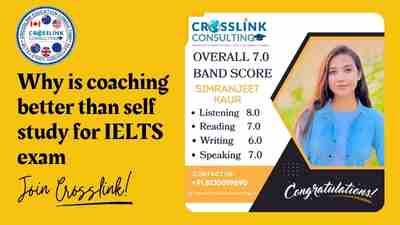Coaching vs. Self-Study in IELTS
It has always been debatable whether coaching is better than self-studies for the IELTS (International English Language Testing System) exam. The answer to this question depends on the individual learning style, needs, and circumstances. Both approaches have advantages and disadvantages. So, the choice between them should depend on your personal preferences and goals. Here are some factors to consider when deciding between coaching and self-studies for the IELTS:

Advantages of IELTS Coaching:
- Structured Learning: Coaching programs often provide a structured curriculum that covers all aspects of the IELTS exam, including listening, reading, writing, and speaking. This can be helpful for students who prefer a guided approach.
- Expert Guidance: Coaches and instructors are typically experienced in teaching IELTS and can provide expert guidance and feedback on your strengths and weaknesses. They can help you identify areas that need improvement and offer personalized strategies for success.
- Practice Tests: Coaching programs often include regular practice tests, which can help you become familiar with the format and timing of the exam. This can be invaluable in building test-taking skills and reducing anxiety.
- Motivation and Accountability: Joining a coaching class can provide motivation and accountability. Knowing that you have regular classes and assignments can keep you on track with your study schedule.
- Peer Interaction: In a coaching class, you’ll have the opportunity to interact with fellow IELTS test-takers. Sharing experiences and strategies with peers can be beneficial in your preparation.
Advantages of Self-Studies for IELTS:
- Flexibility: Self-study allows you to create a flexible study schedule that suits your needs and availability. You can study at your own pace and adjust your focus based on your strengths and weaknesses.
- Cost-Effective: Self-study is often more cost-effective than enrolling in a coaching program, as you won’t need to pay for tuition fees or materials.
- Customization: With self-study, you can tailor your preparation materials to your specific requirements. You can choose textbooks, online resources, and practice tests that align with your learning style.
- Independence: Self-study promotes independent learning and self-discipline, skills that can be valuable in the long term.
- No Commute: You don’t need to commute to a coaching center if you choose self-study, which can save you time and transportation costs. Ultimately, the choice between coaching and self-studies for IELTS depends on your learning style, budget, and available time.

Some students may benefit from the structured guidance of a coaching program, while others may excel through self-discipline and self-guided study. It’s essential to assess your own strengths, weaknesses, and preferences and choose the approach that aligns best with your goals and resources. Additionally, some individuals may even opt for a combination of both self-study and coaching to maximize their chances of success on the IELTS exam.
The choice between self-study and coaching should be an individual decision and preference based on the learning style. So, decide wisely.
Team Crosslink wishes you All the best!


Leave a Reply